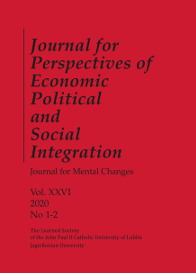Growth of Employability through Reinforcing Apprentice Career Paths in Craftsmanship
Abstract
The chapter deals with the nowadays questions of employers about whether it makes sense to invest in employees, and how to retain people who are important to the company in prospect of craft SMEs and employability, and how to increase the employment rate in Poland and other EU countries. It describes the concept of job carving and job crafting and shows how to join this ideas with apprentice learning in crafts. The chapter devotes also a place to describe the reigniting the culture of entrepreneurship in Europe as an important response to the COVID crisis with recovery strategies to build resilience within European supply chains and ecosystems, restore consumer and business confidence, stimulate investment and help the unemployed back into work.
References
Akkermans, J., & Kubasch, S. (2017). Trending topics in careers. A review and future research agenda. Career Development International, 22, 586–627.
Arthur, M. B., Khapova, S. N., & Wilderom, C. P. M. (2005). Career success in a boundaryless career world. Journal of Organizational Behavior, 26, 177–202.
Bacigalupo, M., Kampylis, P., Punie, Y., & Van den Brandeprovides, G. (2016).
EntreComp: The Entrepreneur-ship Competence Framework. Luxembourg: Publication Office of the European Union; EUR 27939 EN. https://doi.org/10.2791/593884.
Commission Recommendation (2003). The definition of micro, small and mediumsized enterprises, of 6 May. C(2003) 1422, 2003/361/EC.
Council recommendation (2016). On the integration of the long-term unemployed into the labour market, of 15 February, 2016/C 67/01.
De Cuyper, N., & De Witte, H. (2011). The management paradox: Self-rated employability and organizational commitment and performance. Personnel Review, 40, 152–172.
ec.europa.eu (2020). https://ec.europa.eu/growth/smes/promoting-entrepreneurship/support/education_en [accessed 31.08.2020].
Edin, P.A., & Gustavsson, M. (2008). Time out of Work and Skill Depreciation. Industrial and Labor Relations Review, 61(2), 163–180.
Entrepreneurship 2020 Action Plan (2013). Reigniting the entrepreneurial spirit in Europe. Communication from the Commission to the European Parliament, the Council, the European Economic and Social Committee and the Committee of the Regions. Brussels: COM(2012) 795 final.
Eurostat (2020). https://ec.europa.eu/eurostat/tgm/graph.do?pcode=tesem130&language=en [accessed 05.08.2020].
Griffin, C., Hammis, D., & Geary, T. (2007). The Job Developer’s Handbook. Practical Tactics for Customized Employment. Baltimore: Brookes Publishing.
Hagner, D., Noll, A., & Enein-Donovan, L. (2002). Identifying community employment program staff competencies: A critical incident approach. Journal of Rehabilitation, 68(1), 45–51.
Hall, D. T. (2004). The protean career: A quarter-century journey. Journal of Vocational Behavior, 65, 1–13.
Lang, J., Kern, M., & Zapf, D. (2016). Retaining high achievers in times of demographic change: The effects of proactivity, career satisfaction and job embeddedness on voluntary turnover. Psychology, 7, 1545–1561.
Noworol, Cz. (2020). Apprenticeships and Career Pathways. In J. W. Hedge & G. W. Carter (Eds.). Career Pathways. From School to Retirement (pp. 62–83). New York: Oxford University Press.
Noworol, Cz. (2020a). Competence Repertory, V6. Krakow: NFDK.
Noworol, Cz. (2010). Transition from Education to Working Life. In P. Hartel, M. Marterer (Eds.), School to the World of Work. Effective Preparation, Successful Transition and Sustainable Policy for Youth in Europe (pp. 33–42). Graz: Styrian Association for Education and Economics.
Noworol Cz. (2007). Lifelong Guidance Policy and Education Mobility. In P. Hartel, Z. Freibergova, H. Kasurinen, Ch. Schiersmann, & Cz. Noworol (Eds.), Lifelong Guidance for Lifelong Learning (pp. 86–94). Graz, Krakow: Styrian Association for Education and Economics, Jagiellonian University.
Tims, M., Bakker, A. B., & Derks, D. (2012). Development and validation of the Job Crafting Scale. Journal of Vocational Behavior, 80, 173–186.
Tims, M., Bakker, A. B., & Derks, D. (2013). The Impact of Job Crafting on Job Demands, Job Resources, and Well-Being. Journal of Occupational Health Psychology, 18(2), 230–240.
Wrzesniewski, A., & Dutton, J. E. (2001). Crafting a Job: Revisioning Employees as Active Crafters of Their Work. The Academy of Management Review, 26(2), 179–201.
Wuiame, N. (2019). Job carving and job crafting: a gender perspective. Ppt presentation. Malta: ETN meeting, 21.05.2019. https://ec.europa.eu/esf/transnationality/library [accessed 09.07.2019].
Copyright (c) 2020 Journal for Perspectives of Economic Political and Social Integration

This work is licensed under a Creative Commons Attribution-NonCommercial-NoDerivatives 4.0 International License.

